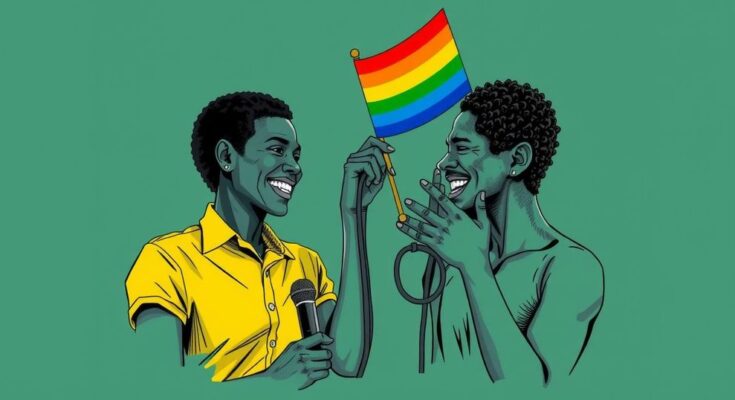The Ugandan LGBTQ community faces escalating online violence fueled by broad discriminatory laws. Amnesty International’s report reveals alarming levels of technology-facilitated gender-based violence, exacerbated by the Anti-Homosexuality Act (AHA) 2023. The environment has become so hostile that many LGBTQ individuals feel unable to report abuses, leading to severe offline consequences, including violence and economic hardship.
Online attacks against Uganda’s LGBTQ communities have surged alarmingly due to broad laws that criminalize many aspects of their lives. A recent report from Amnesty International highlights disturbing patterns of technology-facilitated gender-based violence (TfGBV), including doxing, threats, and blackmail. The Anti-Homosexuality Act (AHA) 2023 has exacerbated an environment of impunity, prompting LGBTQ individuals to alter their online behavior drastically. Shreshtha Das of Amnesty International emphasizes that while activists strive to navigate these hostile digital spaces, the stigma and violence faced offline echo unfavorably online. The consequences of TfGBV are chilling; they often manifest into severe offline repercussions like arbitrary arrests and physical harm. Amnesty’s investigation found widespread TfGBV in six cities across Uganda, detailing how state authorities not only neglect but also encourage these abuses, leaving LGBTQ individuals to face grave human rights violations. Many LGBTQ individuals rely on digital platforms for community-building and accessing vital health information, but government crackdowns deepen the peril they face. Marco Perolini of Amnesty International notes that instead of combating TfGBV, Ugandan authorities are targeting human rights defenders, creating a climate of fear and silencing. Consequently, health service providers are forced to retreat from advertising online, fearing reprisals under the guise of promoting homosexuality. This onslaught culminates in police overreach, with reports of devices and data being seized under threats of arrest. Blackmail emerges prominently as a form of TfGBV, with individuals targeted through social media for offline violence. Furthermore, harmful narratives portraying LGBTQ individuals as societal threats intensify discrimination and contribute to social ostracism, economic struggles, and sometimes violence. Roland Ebole, an Amnesty researcher, underscores that the digital realm is marred by the same threats as the physical one, presenting LGBTQ individuals with a dual burden of danger. Since the enactment of the AHA 2023, public discourse around LGBTQ rights has turned increasingly hostile, deterring victims from reporting abuse due to fear of being outed. LGBTQ communities also struggle with the complexities of reporting abuses on social media, often finding the process confusing, compounded by language barriers. Despite reaching out to various organizations about their findings, only Meta and TikTok provided responses to Amnesty’s inquiries. Amnesty calls for the repeal of the AHA 2023 and the establishment of a dedicated mechanism to investigate TfGBV against LGBTQ individuals effectively. Shreshtha Das underscores the urgency for authorities to safeguard rights and ensure accountability for human rights violations.
The situation of LGBTQ communities in Uganda is critical, with recent reports highlighting the drastic rise in online attacks due to discriminatory laws. The Anti-Homosexuality Act (AHA) 2023 has fostered a hostile environment, leading to widespread technology-facilitated gender-based violence. This undercurrent of violence not only alienates LGBTQ individuals but significantly impacts their mental health and ability to connect with one another fearlessly. The role of social media, initially a sanctuary, feels increasingly perilous for those in the LGBTQ community due to rampant discrimination and targeted attacks.
The report from Amnesty International sheds light on the grim realities facing Uganda’s LGBTQ communities amidst rising hostility and legal discrimination. The connection between online platforms and real-world violence is stark, with the government’s inaction exacerbating the crisis. To ensure safety and human rights, urgent action is required, including the repeal of harmful laws and the accountability of violators.
Original Source: www.amnesty.org



